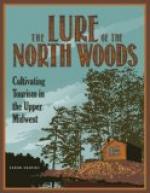“It’s a pretty good hide although the forequarter’s cut away,” he said. “Still I don’t know that I wanted the thing and reckon the half-breed who sold it me got its value in cartridges and food. Now transport’s difficult, I hope he and his Indian friends won’t bring us any more of the damaged stock they can’t sell to the Hudson’s Bay.”
Thirlwell nodded. The rivers were frozen and canoeing was stopped, while the bush was deep in fresh, loose snow. It would be a long and strenuous business to break a trail to the south, and in winter the mine was often cut off from the settlements. Provisions sometimes ran short, but Scott found it hard to refuse the starving Indians a share of his supplies.
“You bought a fine skin,” he resumed. “I haven’t seen the thing since. What have you done with it?”
“I sent it away,” said Thirlwell. “Old Musquash said he’d try to make the settlements and took it out for me.”
“He’ll probably get through, though I don’t think a white man could. But I didn’t know you had friends in Canada.”
Thirlwell did not reply. He had bought the skin for Agatha and now wondered what she would think about his present, or whether she might feel he ought not to have sent it. Still he doubted if the skin would arrive, because the old half-breed would meet with many dangers on the way. Thirlwell pictured him hauling his sledge up thinly frozen rivers, crossing wide lakes swept by icy gales, and plunging into tangled forests smothered in snow. The thought of it emphasized the sense of isolation one often felt at the mine, but while he mused there was a knock at the door.
“I expect it’s an Indian come to beg for food,” Scott remarked and the door swung open.
The flame of the lamp leaped up and then nearly flickered out as a shower of snow blew in. The stove roared and the room got horribly cold, and for a moment or two a shaggy, white figure, indistinct in the semi-darkness, struggled to close the door. Then there was a sudden calm and when the light got steady an Indian in ragged furs leaned against the table, breathing hard and holding out a note.
“From Father Lucien,” said Scott, who took the folded paper. “He’s had a sick man on his hands for three or four days and wants one of us to relieve him. I allow I’d sooner stop here. It’s pretty fierce to-night.”
“Who’s sick?” Thirlwell asked.
“Black Steve. I don’t know that he has much claim on us, but Father Lucien’s a good sort. I guess we’ve got to help him out.”
Thirlwell nodded. Father Lucien was a French-Canadian missionary who had studied medicine, and, for the most part, lived with his wandering flock. In summer, he went North with canoe and tent, but generally returned in winter to a shack near the mine. Scott and Thirlwell had found his society pleasant when they sat round the stove on long cold nights, for the priest had been trained in Europe and knew the great world as he knew the Canadian wilds. A scholar and something of a mystic, he was marked by a wide toleration and liberality of thought.




